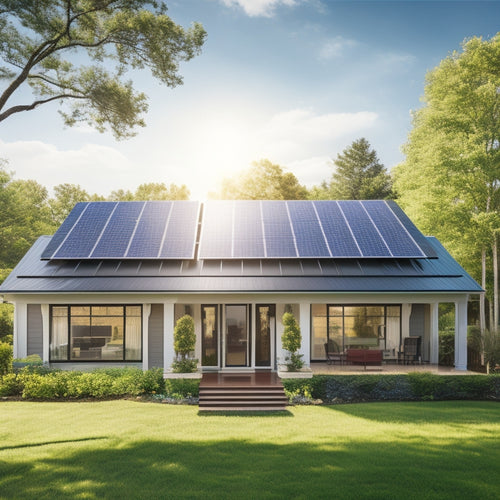
Ditch Fossil Fuels for Eco-Friendly Energy Alternatives
Share
Ditching fossil fuels for eco-friendly energy alternatives is essential for a sustainable future. By embracing renewable sources like solar, wind, and hydropower, you can lower your carbon emissions and reduce energy costs in the long run. These alternatives not only improve air quality but also create jobs and strengthen local economies. Plus, advancements in energy efficiency help you save even more while promoting grid stability. As you consider this shift, you'll benefit from tax incentives and long-term savings. Exploring the various options available will help you find the best fit for your needs and goals.
At a Glance
- Transitioning to renewable energy sources like solar, wind, and hydropower can significantly reduce reliance on fossil fuels.
- Implementing energy-efficient technologies and practices lowers utility costs and enhances sustainability.
- Utilizing local renewable resources fosters economic growth and job creation in communities.
- Investing in eco-friendly energy alternatives leads to lower greenhouse gas emissions and improved air quality.
- Financial incentives and rebates are available to support the adoption of renewable energy systems.
Sustainable Energy for Future Generations
Sustainable energy for future generations hinges on utilizing renewable energy sources and implementing energy efficiency innovations.
By investing in technologies like solar, wind, and geothermal, you can greatly reduce carbon footprints and promote a cleaner environment.
Solar energy reduces fossil fuel reliance and contributes to a sustainable future.
Additionally, prioritizing energy efficiency in homes and businesses can lead to considerable cost savings and a more sustainable energy environment.
Renewable Energy Sources
Renewable energy sources, such as solar, wind, and hydropower, offer viable solutions for powering our future while reducing environmental impact. By capturing solar power, you can access a limitless resource, converting sunlight directly into electricity. Wind energy seizes the movement of air, generating clean power through turbines.
Both methods have significant advantages, particularly when combined with energy storage systems, allowing you to make use of electricity even when the sun isn't shining or the wind isn't blowing.
Geothermal heating provides another sustainable option by tapping into the Earth's natural heat. Similarly, biomass solutions employ organic materials, turning waste into energy, which supports waste reduction and sustainability.
Hydropower benefits communities by generating electricity from flowing water, while tidal energy seizes the ocean's power, showcasing diverse renewable options.
Community solar initiatives make it easier for individuals to invest in solar power collectively, expanding access. Electric vehicles (EVs) can further reduce reliance on fossil fuels, especially when charged using renewable energy.
Energy Efficiency Innovations
As energy demands continue to rise, innovations in energy efficiency are vital for minimizing consumption and maximizing output. One significant advancement in this field is the development of smart thermostats. These devices learn your habits and preferences, allowing you to optimize heating and cooling schedules based on when you're home or away.
By automatically adjusting temperatures, smart thermostats can reduce energy waste and lower utility bills, contributing to a more sustainable lifestyle.
Another important innovation is energy storage technology. As renewable energy sources like solar and wind become more prevalent, efficient energy storage systems enable you to utilize this energy for later use.
By storing excess energy generated during peak production times, you can reduce reliance on fossil fuels during high-demand periods. This not only enhances grid stability but also gives you the ability to use clean energy when it's most needed.
Incorporating these innovations into your daily life not only increases your energy efficiency but also aligns with a broader commitment to sustainability.
Cost Savings Over Time
When you consider eco-friendly energy alternatives, the long-term financial benefits can be significant.
Home solar panel kits provide substantial savings by reducing grid reliance and enhancing electricity bill savings, with the potential to sell excess energy back to the grid through net metering key factors for grid-tie systems.
By taking advantage of various incentives and rebates, you can further enhance your savings over time.
Understanding these factors is vital for making informed decisions about your energy investments.
Long-Term Financial Benefits
Investing in eco-friendly energy alternatives can lead to significant long-term financial benefits, particularly through cost savings over time. By shifting to renewable sources like solar or wind power, you can drastically reduce your energy bills. Unlike fossil fuels, which are subject to volatile price swings, renewable energy often provides a level of investment stability that enhances your financial security.
Once the initial investment is made, maintenance costs for renewable systems typically remain low, meaning more of your money stays in your pocket. Additionally, as technology advances, the efficiency of these energy systems continues to improve, further amplifying your savings. Over time, these cost reductions can accumulate, allowing you to assign funds to other areas of your life or investments.
Moreover, adopting eco-friendly energy can lead to property value increases, as more buyers are drawn to homes that employ sustainable energy solutions.
Ultimately, embracing these alternatives not only protects the environment but also positions you for a financially secure future. By thinking long-term, you can enjoy the freedom that comes with reduced energy costs while contributing to a healthier planet.
Incentives and Rebates Available
Many homeowners and businesses can enhance their financial advantages through various incentives and rebates specifically designed for eco-friendly energy alternatives. Understanding these options is essential in maximizing your savings while contributing to a sustainable future.
Here's a breakdown of some common incentives and rebates available:
| Incentive Type | Description | Potential Savings |
|---|---|---|
| Federal Incentives | Tax credits for renewable energy installations | Up to 26% of costs |
| Local Rebates | Cash rebates for energy-efficient upgrades | Varies by location |
| State Incentives | Grants for energy projects | Typically $1,000-$5,000 |
| Utility Program | Discounts for energy-saving appliances | Up to $500 |
| Loan Programs | Low-interest loans for energy projects | Depends on loan amount |
Key Benefits of Eco-Friendly Energy
Eco-friendly energy sources considerably reduce environmental impact by lowering greenhouse gas emissions and conserving natural resources.
By investing in these alternatives, you also contribute to economic growth, as they create jobs and stimulate innovation in sustainable technologies.
Additionally, energy autonomy and independence from fossil fuels allows individuals to take control of their energy consumption.
Understanding these benefits can guide your choices toward a more sustainable future.
Environmental Impact Reduction
Shifting to renewable energy sources greatly reduces environmental impact, offering numerous benefits that contribute to a healthier planet. By utilizing wind, solar, and hydroelectric power, you can notably cut your carbon footprint. This change helps mitigate the effects of climate change, preserving ecosystems and biodiversity. Fossil fuels release harmful pollutants and greenhouse gases, which not only degrade air quality but also threaten wildlife habitats.
Moreover, renewable energy supports ecosystem restoration. As you move away from extraction methods associated with fossil fuels, you allow natural environments to recover from industrial damage. Healthier ecosystems enhance carbon sequestration, further reducing atmospheric CO2 levels. This cycle of restoration and regeneration encourages resilience against climate change.
Additionally, adopting eco-friendly energy can promote sustainable practices within your community. By choosing local renewable sources, you strengthen local economies and create jobs in green technology, all while ensuring a cleaner environment.
This commitment to sustainability not only enables you but also future generations. In embracing renewable energy, you're taking an essential step toward a more sustainable, liberated lifestyle, free from the constraints imposed by fossil fuel dependency.
Economic Growth Potential
Investing in renewable energy can greatly enhance economic growth, benefiting both individuals and communities. By shifting towards eco-friendly energy sources, you're not only addressing environmental concerns but also revealing substantial economic potential.
One key area is job creation. The renewable sector has shown to be more labor-intensive than fossil fuels, meaning more jobs are available per unit of energy produced. This change can lead to a diverse range of employment opportunities, from manufacturing to installation and maintenance.
Moreover, renewable energy encourages economic resilience. By diversifying energy sources, communities can reduce their dependency on volatile fossil fuel markets. This stability can protect local economies from price shocks and supply disruptions.
| Benefit | Description | Impact |
|---|---|---|
| Job Creation | Increased employment opportunities | Economic growth |
| Economic Resilience | Stability against market fluctuations | Community security |
| Local Investment | Encourages local businesses | Strengthened economy |
| Innovation | Drives technological advancements | Future job growth |
In essence, shifting to renewable energy not only addresses climate change but also builds a strong economy that supports both freedom and sustainability.
Selecting Based on Energy Source
When selecting an eco-friendly energy source, it's essential to take into account the variety of renewable energy options available.
Each source, from solar to wind, offers different levels of efficiency and sustainability that can impact your overall energy strategy.
For instance, solar power systems not only provide energy independence and autonomy but also contribute to significant financial benefits through cost savings on utility bills.
Evaluating these factors will help you make informed decisions that align with your environmental goals, such as embracing energy independence.
Renewable Energy Options
There are numerous renewable energy options available, each offering unique benefits based on the energy source used. When considering solar technology, you'll find it utilizes sunlight to generate electricity, making it an abundant and sustainable choice. Solar panels can be installed on rooftops or in solar farms, providing flexibility in how you access this energy.
On the other hand, wind potential is another enticing option. Wind turbines convert kinetic energy from wind into electricity, which can be particularly effective in areas with consistent wind patterns. This method not only reduces reliance on fossil fuels but also contributes to local economies through job creation in manufacturing and maintenance.
Both solar and wind energy solutions allow you to reduce your carbon footprint while promoting energy independence. By investing in these alternatives, you're not just choosing cleaner energy; you're also embracing a lifestyle that values sustainability.
Your choice between solar technology and wind potential can depend on various factors, including location, budget, and personal preference. Ultimately, moving towards these renewable energy options enables you to contribute to a healthier planet and a more sustainable future.
Energy Source Efficiency
Choosing the most efficient energy source requires careful evaluation of various factors, including the specific characteristics of each option. When assessing energy sources, think about their energy conversion rates. For instance, solar panels convert sunlight into electricity with varying efficiency based on technology and location. Wind turbines also have specific conversion efficiencies that can fluctuate with wind conditions.
Another vital aspect is grid integration. How well an energy source can be integrated into the existing electrical grid greatly affects its overall efficiency. Some renewable sources, like geothermal and hydro, offer consistent output and can easily complement grid demands. In contrast, solar and wind energy can be intermittent, which necessitates effective storage solutions or backup systems to maintain a steady energy supply.
You'll want to contemplate not just the immediate efficiency but also the long-term sustainability and potential for innovation in energy conversion technologies. By selecting energy sources with high efficiency and good grid integration potential, you enable yourself to contribute to a more sustainable future, ensuring freedom from fossil fuel dependency and supporting eco-friendly alternatives.
Lower Carbon Emissions Overall
When you consider renewable energy sources, their impact on lowering carbon emissions becomes clear.
Utilizing wind, solar, and hydroelectric power markedly reduces reliance on fossil fuels, which are major contributors to greenhouse gas emissions.
Renewable Energy Impact
Utilizing renewable energy sources substantially reduces carbon emissions, contributing to a healthier planet. By shifting from fossil fuels to solar, wind, and hydroelectric power, you're not only lowering greenhouse gases but also promoting sustainable practices that can invigorate your community.
This shift often sparks community engagement, as local residents rally around the benefits of cleaner energy and the potential for job creation.
Additionally, policy advocacy plays a vital role in this change. When you support initiatives that promote renewable energy, you help shape regulations that encourage investment in sustainable technologies. By participating in local advocacy efforts, you can influence decision-makers to prioritize eco-friendly energy solutions, ensuring that they're accessible and affordable for everyone.
The impact of adopting renewable energy extends beyond just reducing carbon emissions; it cultivates a sense of autonomy and responsibility toward the environment. Embracing these alternatives enables you and your community to take control of your energy future, ensuring a legacy of sustainability for generations to come.
Fundamentally, the move to renewable energy isn't just a personal choice but a collective commitment to a healthier, more sustainable world.
Frequently Asked Questions
What Are the Potential Job Impacts of Switching to Eco-Friendly Energy?
Switching to eco-friendly energy could reshape the job market considerably. You'll find new opportunities requiring skill development in renewable technologies, potentially creating jobs while also necessitating retraining for those in traditional energy sectors.
How Can Individuals Contribute to Renewable Energy Initiatives?
Ever wondered how your actions can spark real change? You can support renewable energy initiatives by participating in community solar projects, advocating for solar panel installation, and educating others on the benefits of sustainable energy solutions.
Are There Government Incentives for Adopting Renewable Energy Solutions?
Yes, there are government incentives for adopting renewable energy solutions. You can benefit from tax credits and energy rebates, which greatly reduce costs, making it easier for you to invest in sustainable technologies for your home.
What Are the Environmental Impacts of Manufacturing Renewable Energy Technology?
When you consider the environmental impacts of solar panel production and wind turbine manufacturing, you'll notice significant resource extraction, energy consumption, and waste generation, though these are often outweighed by the benefits of renewable energy deployment.
How Can Communities Transition to Renewable Energy Collectively?
To shift to renewable energy collectively, you should investigate community solar projects. By engaging in collective action, you can utilize shared resources, lower costs, and enable your neighborhood to achieve sustainable energy independence while promoting collaboration.
Explore More
As you stand at the crossroads of energy choices, embracing eco-friendly alternatives lights the path towards a sustainable future. By shifting away from fossil fuels, you're not just reducing costs over time; you're cultivating a cleaner planet for generations to come. Each renewable source you choose acts as a seed, sprouting lower carbon emissions and a healthier environment. So, take a step forward, and let your energy decisions ripple through the world, creating waves of positive change.
Related Posts
-

Solid State Batteries in Electric Vehicles
Solid-state batteries revolutionize electric vehicles by offering a longer lifespan and higher energy density than tr...
-

Smart Home Thermostats to Revolutionize Your Space
Smart home thermostats revolutionize your space by providing precise temperature control and optimizing energy saving...
-

Home Solar Installation Cost
You're considering installing solar panels on your home, and the upfront cost is likely the biggest hurdle standing i...


